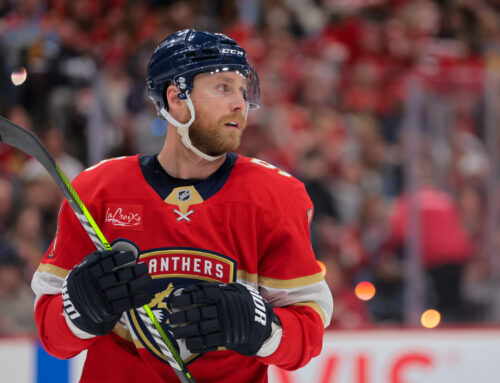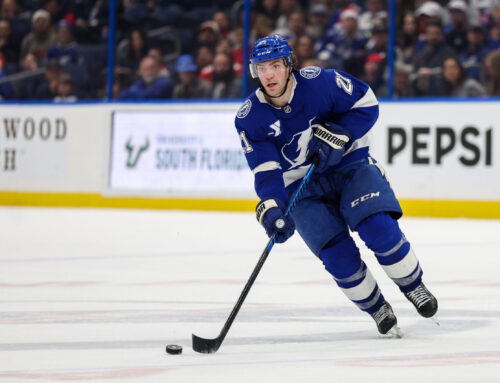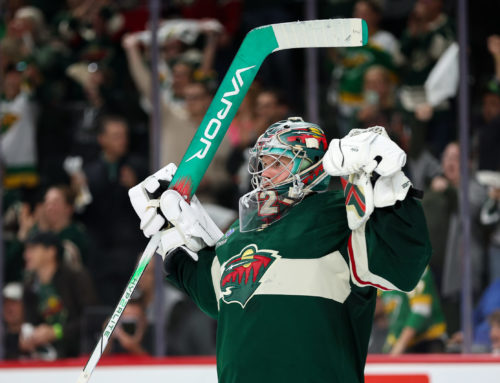
Roos takes a look at non-playoff teams and gives suggestions on which players will improve and who will disappoint in 2013-14. First up – the Eastern Conference
This time of year, most fantasy hockey enthusiasts are either closely following their guys in the playoffs or taking a break until free agent signings begin during the summer. The problem is that both approaches ignore the players on the 14 teams which didn't make the NHL playoffs, and risks an "out of sight, out of mind" situation where you won't be able to remember enough about these players when the time comes for retentions or offseason deals.
Here is the first of a two-part column about players on non-playoffs teams (this week covering the Eastern Conference teams, next week the Western Conference), focusing on two players from each team – one who I think is a good bet to improve next season, and another who I feel will disappoint.
Buffalo Sabres
Improve = Steve Ott
Although Ott's point scoring pace was down slightly from 2011-12, signs are pointing to much improved results next season. One key is that even though his overall ice time was almost identical to the 2011-12 season (18:33 last season versus 18:20 the previous year), it was the highest among all Sabres forwards. And what's interesting is that despite his overall TOI not increasing by very much, his power play time was up by more than 25% (2:39 this season, compared to 2:01 in 2011-12). With former captain Jason Pominville now gone, the Sabres will be leaning on Ott quite a bit as they try to recover from several subpar seasons. I like his chances to get 50 points next season, while still remaining a Hits and PIM machine.
Disappoint = Ville Leino
Believe it or not, Leino had a higher points per game scoring average in 2012-13 than Patrick Sharp, Evander Kane, Jeff Carter, or David Krejci, to name just a few. Yes, that came from six points in eight games, but I'm sure some people will see that and think it's a sign of Leino again being a candidate for 50+ points. I'm here to tell you the only way I'd bank on Leino definitely getting 50+ points again would be is if the season was 182 games, and even then it might be a stretch, since for now his 53 points in 2010-11 sticks out as one of the most glaring examples of atypical production in the last decade.
Carolina Hurricanes
Improve = Justin Faulk
Although Faulk hasn't translated his superb talent into high scoring just yet, if you saw him play this season you couldn't help but notice a lot of the dots starting to connect. And as we've seen in recent years with Mike Green and Erik Karlsson, young defensemen can make huge jumps in points from one season to the next. In fact, both of those guys had big breakouts in their third full season, which is where Faulk will be next year (if you count last year as a full season). Plus, even if Joni Pitkanen (more on him below) manages to stay healthy in 2013-14, Carolina's defense is now Faulk's to run, as evidenced by the 24 minutes per game he averaged last season (tops among all Hurricanes defensemen) and the jaw dropping 61 minutes he played in the team's final two games.
Disappoint = Joni Pitkanen
Not only did Pitkanen play just 52 of a possible 130 games over the past two seasons, but he scored at only a 0.5 points per game pace in those contests. At least with someone like Jason Spezza or Joffrey Lupul you get a band-aid boy who's elite when he's healthy, but not Pitkanen – at least not anymore. In fact, Pitkanen has a grand total of just two seasons where he played 70+ games and scored at more than a 0.5 points per game pace, with the most recent of those seasons coming all the way back in 2009-10. And it's not like Pitkanen gives you huge secondary stats – he usually ends up with (or projects to) below 200 combined hits and blocked shots, which is barely middle of the road for a defenseman who plays as many minutes as he does. At this stage in his career, Pitkanen is both an injury risk and a points risk – not a combination you want on your squad.
Columbus Blue Jackets (they'll be in the Eastern Conference in 2013-14)
Improve = Mark Letestu
In my recent column I highlighted how I thought Letestu was showing signs of being a breakout candidate for next season. And even though I try not to cover the same guy in two columns that are close in time I felt I had to again point out how strongly I feel that Letestu is poised to explode offensively. What's nice is although he did well in 2012-13, it wasn't so great as to automatically have him show up on everyone's radar for next season. Sure, some people might wisely predict great things for Letestu, but I still think there's a chance for you to grab him in drafts at a good price, or snag him in a trade without giving up a lot in return. Then you can just sit back and watch Letestu reward you with 55+ points, with a realistic chance at 60 next season and beyond.
Disappoint = James Wisniewski
Wisniewski is a lot like Pitkanen in that he's become so injury plagued that it has forced his team to look elsewhere for rearguard production and responsibility. Plus, in the case of Columbus, they played their best stretch of hockey in March and April when Wisniewski suited up for only 15 games and produced a measly five points to go along with a +1 rating. Contrast that with Fedor Tyutin (11 points in 28 games during March and April, +12) and Jack Johnson (11 points in 26 games, +5) and you can see that Columbus should realize it doesn't need Wisniewski to succeed. In the end, even though Wisniewski's point average in his past three injury plagued seasons is actually over 0.6, I wouldn't count on him even hitting 40 points next season, with him settling into more of a "third banana" role in Columbus.
Florida Panthers
Improve = Shawn Matthias
Matthias is a great guy to target, as, like Letestu, his final totals (21 points in 48 games) don't immediately jump out. But make no mistake – Matthias turned a major corner in 2012-13. In many games he was the best player on the ice for either team, finally starting to use his size to his advantage. Looking at his stats in 16 March games, he had 13 points (including an astounding 11 goals) and was +3. The fact that he took a big step back in April (only four assists in 16 games, -10) actually should help poolies, as it caused him to fade out of the spotlight and ensured that his point totals would not be so high as to make him an obvious candidate for drafting or target for trading. It could still be another season before he becomes a 55+ point player, but now is the time to grab him to make sure you can reap the benefits when – not if – they come.
Disappoint = Kris Versteeg
Versteeg picked the wrong time to get hurt, as players like Matthias, Jonathan Huberdeau, and even Drew Shore emerged as reliable top six talent for the Panthers over the course of the season. And while Versteeg's veteran presence (and three more years at $4.4 million per year) will still result in him getting ice time with the Panthers, especially if UFA Stephen Weiss signs elsewhere, I think he won't be counted on for offense nearly as much as he was in 2011-12, when he scored 54 points in 71 games. Instead, Versteeg's role in Florida next season and beyond will most likely result in him going back to being more like the 40-50 point player that he was in 2009-2011 than the go to guy he became in his first season as a Panther.
New Jersey Devils
Improve = Travis Zajac
It's pretty amazing to see that Zajac scored only a few more points over the past three combined seasons (70 in 145 games) than he had in 2009-10 alone (67 points in 82 games). It would seem that Zajac has taken a big step back, whether due to injuries or the security of the $46 million contract he signed in January. But I see him as a great bounce back candidate, if only because the Devils don't really have many better top six options, and with that big contract in place they essentially have to keep giving him key minutes. Plus, many players do poorly in their first season back from a major injury, and only start to return to form during the next full season. Sure, it would be a stretch to predict 67 points again in 2013-14, but something around 55-60 points seems within reach.
Disappoint = Andrei Loktionov
Loktionov turned heads with 12 points in 28 games (including points in five of his first six games) after being dished to the Devils from LA, where he had failed to stick in the NHL. But ask yourself this – when a team as offensively starved as the Kings gives up on a former highly touted prospect, shouldn't that be cause for concern? Plus, when the season was on the line for the Devils in April, Loktionov had one measly point in ten games, and by the final five games of the season was playing below 14 minutes per contest. Don't get me wrong – I'm not saying that Loktionov should be written off entirely, only that you shouldn't pencil him in as a guy to break out next season because he still has a lot more growing pains to go through.
Philadelphia Flyers
Improve = Matt Read
Let me say this right off the bat – Matt Read will likely never be a 70 point player. But he's one of those guys who has enough talent to command ice time and respect from the coaching staff, and in fact was the only Flyer other than Claude Giroux to get over 18:00 of ice time per game last season. His PP time did slip to under two minutes per game, but with Jaromir Jagr gone and Danny Briere (more on him below) on the decline, Read is the most likely beneficiary of their PP minutes. Read's biggest problem – if you can call it that – is he's too good of an all-around player, and as a result is saddled with over two minutes of PK time per game. But even if that continues I see Read as being a great bet to surpass 55 points this season.
Disappoint = Daniel Briere
Briere has seen his scoring pace drop significantly in the past two seasons (only 65 points in 104 total games, after 121 points in his previous 132 games). And although Briere has had subpar years in the past, it's more concerning now that he's 33 years old and with nearly 850 regular season games played. Plus, his ice time numbers are troubling, with his PP time sliding below 3:00 for the first time since he became a Flyer in 2007 and ranking only fifth among Philly forwards. And his overall TOI has gone from 18:18 in 2010-11, to 17:21 in 2011-12, to just 16:02 last season. You need be sure to resist the urge to grab Briere next season, as even though he's a known commodity and a proven past performer it seems like a continued decline is all but inevitable at this stage of his career.
Tampa Bay Lightning
Improve = Matt Carle
Carle had a decent season in his first campaign with Tampa Bay, finishing with just under 0.5 points per game. Despite that, many fantasy GMs were likely frustrated that he didn't get them the roughly 30 points they expected when they drafted or traded for him. But if you look beneath the surface you can see that Carle ended on a torrid scoring pace, with 11 points in the final 14 Lightning games. With Victor Hedman still not showing any clear signs of breaking out offensively, Carle should remain the first option for blueline points in Tampa. And with a year under his belt for his newest team, not only should he now be able to meet the lofty expectations that were previously placed on him, but the beauty is you won't have to pay nearly the steep price to get him as you would've before last season.
Disappoint = Alex Killorn
Many fantasy hockey GMs will look at Kilorn's 19 points in 38 games and pencil him in for 50+ points in 2013-14 as part of the potent Lightning offense that finished fifth overall in goals. But the problem is that Tampa Bay leans so much on Steven Stamkos, Martin St. Louis, Teddy Purcell, and Vincent Lecavalier, that placing any stock in the production of any other forward is a very risky proposition. Yes – that still leaves two spots for the Tampa top six, but even if Kilorn lands in one of those spots there are only so many points to go around. And keep in mind that many of Kilorn's points last season came after Cory Conacher left town and while Benoit Pouliot and Ryan Malone were both injured. Plus, with Tampa having missed the playoffs yet again, the team is likely to be active this off season, and most any forward they grab will likely leapfrog over Kilorn on the depth chart. Don't get me wrong – it still might be worthwhile to grab Kilorn, but I suspect that the price will be far higher than would justify getting him.
Final Verdict
The biggest keys to remember in looking for guys on non-playoff teams who are likely to improve next season is (1) target players who will get top minutes, since without that it will be an uphill battle; (2) focus on players (like Letestu, Matthias, or Read) whose final numbers don't tell the real story, since those are guys you'll be able to get for good draft/trade value; and (3) target players who ended the season on a high note, like Carle. For guys who are likely to disappoint, the advice is less clear cut, but definitely try to avoid guys (like Briere, Pitkanen, Wisniewski) whose name value now far exceeds their actual value, as well as guys (like Kilorn, Loktionov) who other GMs might be tempted to overvalue due to breakout potential that is unlikely to materialize soon, if at all.
What's good about this advice is it also will apply for the most part to guys on teams which did make the playoffs. And even if you disagree with the assessments I've made here, hopefully this article has awakened (or reminded) you as to the importance of spending time now to make sure you remember key points about the players who are already working on their tans and golf games. If you wait until July or later to think about these guys, you'll be surprised how much you've forgotten by then, and you could fall into the trap of just relying upon final numbers, rather than the story behind those numbers.
Recent Holding Court articles:
| Time to Downgrade – Part 2 | ||
| Time to Downgrade | ||
| The Playoff Chase – Fantasy Impact | ||
| What’s got into these guys? |





 FLA
FLA CHI
CHI NYR
NYR PIT
PIT L.A
L.A COL
COL MTL
MTL ANA
ANA STL
STL N.J
N.J VAN
VAN PHI
PHI
